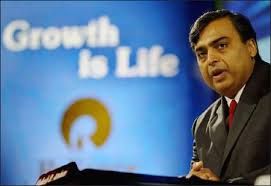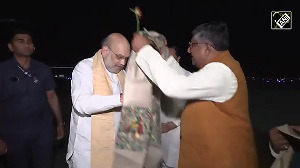With Mukesh Ambani taking over Network 18, the space for disseminating a diverse range of views could shrink, feels Paranjoy Guha Thakurta.
 Now that India's richest man Mukesh D Ambani is formally the head of the country's biggest media conglomerate, it is but natural that questions will be raised as to what this development means for freedom of expression in the world's largest democracy.
Now that India's richest man Mukesh D Ambani is formally the head of the country's biggest media conglomerate, it is but natural that questions will be raised as to what this development means for freedom of expression in the world's largest democracy.
It can be contended that the recent takeover of the Network18 group by Reliance Industries Limited, India's largest privately-owned corporate entity, does not forebode well for the media.
The space for disseminating a diverse range of views could shrink.
More specifically, the relative freedom to air opinions that are perceived to be against the interests of RIL could get constricted, given the fact that a substantial section of the media in India is already wary of antagonising companies that are not merely major advertisers but politically influential as well.
Most media companies in India, as well as across the world, are performing poorly because of at least two important reasons.
The finances of traditional media organisations have been squeezed because of the deceleration or fall in advertising expenditures in the wake of the Great Recession.
Secondly, the exponential growth of the internet that is making huge volumes of information available almost free, is acting as the proverbial double-whammy on the fortunes of much of the corporate media.
If the financial state of the media is indeed all that precarious, why should RIL be expanding its footprint over the Indian media?
The answer is not too difficult to find: control over the media implies more political clout which, in turn, translates into greater power to influence economic policies and shape public opinion.
And if in the process, this is good for business, all the better!
After all, Reliance Jio is currently engaged in setting up one of the biggest -- if not the biggest -- fourth-generation high-speed, data transfer networking systems across the country at a time when technological convergence has blurred the difference between telecommunications and broadcasting.
Two and a half years ago, in January 2012, the Reliance group had invested heavily in the Network18 group promoted by Raghav Bahl (who was then deep in debt) through a complex, multi-layered financial arrangement.
The deal entailed a virtual amalgamation between Network18 and the Eenadu group based in Andhra Pradesh founded by Ramoji Rao, in which RIL had invested earlier through Nimesh Kampani of JM Financial.
Thus was born the largest media group in India, overtaking both the Bennett Coleman/Times of India group as well as the Rupert Murdoch-controlled STAR group in terms of size and scale of operations.
Although at that time, RIL had claimed that its association with Network18 would not alter managerial or editorial control over the media group, it was also common knowledge then that the terms and conditions under which certain financial instruments -- zero-coupon, optionally-convertible debentures -- were issued were such that the Reliance group could theoretically become de facto owners of Network18 (from being mere investors) at any point of time it wanted to.
This becomes evident from a perusal of the 11-page order of the Competition Commission of India dated May 28, 2012, relating to the subscription of the debentures issued by a clutch of companies controlled by Bahl and his family: RB Mediasoft Pvt Ltd, RRB Mediasoft Pvt Ltd, RB Media Holdings Pvt Ltd, Aventure Marketing Pvt Ltd, Watermark Infratech Pvt Ltd and Colorful Media Pvt Ltd.
Interestingly, the entity used by RIL to subscribe to these debentures was named, rather ironically, as Independent Media Trust.
On May 30, an announcement was made by RIL to the Bombay Stock Exchange that the company's board of directors had approved an additional investment of Rs 4,000 crore (Rs 40 billion) in this so-called Trust to acquire the Network18 group.
The acquisition is taking place at a juncture when the financial health of companies in the Network18 group had improved, with debt on the decline and profitability on the rise.
This was also on account of the downsizing of the group's employee strength in August 2013.
What was not exactly unexpected was the takeover itself.
It seemed the Reliance group had been waiting for the outcome of the general elections to be known on May 16.
After it became clear that Narendra Modi would become prime minister of India and that the Aam Aadmi Party, whose spokespersons had been loudly attacking Reliance on the issue of gas prices, would get only a few seats in the Lok Sabha, the Mukesh Ambani-led company decided to act swiftly.
All those who constituted the core managerial team in Network18, including Raghav Bahl's wife Ritu Kapur, his sister Vandana Malik, chief executive officer B Sai Kumar, chief operating officer Ajay Chacko and chief financial offier RDS Bawa, quickly resigned.
There is considerable speculation that two of the most prominent ‘faces’of the media group on the television screen, Rajdeep Sardesai and his wife Sagarika Ghose, both of whom are currently on leave, will put in their papers towards the end of June.
This is not the first time the Reliance group has been owners of a media organisation.
After the Indian Express, then headed by the late Ram Nath Goenka, had published a series of highly critical articles against the group in the late-1980s, Reliance set up its own daily newspaper, the Business and Political Observer which shut down after a decade.
The Reliance group split in late-2004 and the bigger part of the group headed by the older sibling Mukesh Ambani invested indirectly in media companies, including the ones controlling the NewsX television channel.
This time round, it appears that the Reliance group's interests in the media will not be ephemeral. Its media business synergises well with its broadband and telecom businesses.
As a RIL statement issued on May 30 put it: 'The acquisition (of the Network18 group) will differentiate Reliance’s 4G business by providing a unique amalgamation at the intersection of telecom, web and digital commerce via a suite of premier digital properties.'
The Network18 group owns television channels like CNBC-TV18, CNN-IBN, CNBC Awaaz, IBN7, IBN Lokmat and Colors, websites like Moneycontrol.com, Firstpost.com, In.com, IBNLive.Com, Bookmyshow.com and Homeshop18 (a television cum internet venture), besides printed magazines such as Forbes India and Overdrive, among other brands.
Besides owning the most widely circulated Telugu language daily newspaper, the Eenadu group runs both news and general entertainment television channels in Andhra Pradesh, Telangana, Uttar Pradesh, West Bengal, Maharashtra, Karnataka, Odisha, Gujarat, Madhya Pradesh,Chhattisgarh, Haryana, Bihar, Jharkhand, Uttarakhand and Himachal Pradesh in various languages, including Telugu, Kannada, Hindi,Bengali, Marathi, Odia, Gujarati and Urdu.
Despite the existence of a large number of publications, radio stations, television channels and Internet websites in India, the mass media in the country has been (and continues to be) dominated by a few prominent groups.
This oligopolistic structure of the media has become further entrenched with the acquisition of Network18 by the Reliance group.
Image: Reliance Industries chief Mukesh Ambani; Photograph: Reuters
Paranjoy Guha Thakurta is an independent journalist and educator. He was employed by Television18 (part of the Network18 group) between October 1995 and March 2001 and thereafter, served as a consultant till December 2001.











 © 2025
© 2025